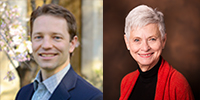Launched in the Fall 2017 semester, University Courses is a cross-college teaching initiative that offers eligible students an opportunity to become immersed in innovative classes that tackle “big questions” though trans-institutional and multi-cultural learning. These courses leverage the natural synergies across Vanderbilt’s 10 schools and colleges, allowing faculty to reach beyond departmental boundaries.
Faculty Seminars sample two of the courses offered during the academic year.
-
2019

Kitt Carpenter: The Causes and Consequences of LGBTQ Public Policies
This course will introduce students to critical questions about public policies for LGBTQ populations including: legal access to same-sex marriage; nondiscrimination policies in employment, housing, and public accommodation, including whether they are trans-inclusive; so-called ‘bathroom bills’; religious freedom restoration laws (also called ‘conscience’ acts); and others. The course will investigate the causes, correlates, and consequences of these policies using the lenses of economics, law, sociology, political science, and public health and medicine. Students will critically analyze leading research articles and mainstream media discussions of LGBTQ-related public policies, hear from guest speaker experts, perform an immersive data-intensive research project, and visit Tennessee state legislators to understand views on a range of LGBTQ-related issues. The course advances multiple parts of the university-wide strategic plan including: immersive research and learning experiences, enhancing the undergraduate residential experience, fostering interdisciplinary perspectives, and focusing on health and health care solutions.

Doug Fischer and Haerin Shin: The Ethics of Artificial Intelligence (AI)
Over the past decade, AI technology has progressed exponentially, becoming a key fabric of our everyday lives across e-commerce, educational and research platforms, entertainment, and the popular imaginary. While marvelous advancements in the sector have been celebrated as the sublimation of human reason, the mysterious workings, existential implication, and potential misuse of AI have also become cause for concern, catalyzing demands to establish ethical standards and regulatory parameters. Responding to this urgent need, this course explores the composition and representations of AI technology from an ethical perspective. Students will learn basic yet fundamental aspects of intelligent, computational modeling and processing, and critically reflect on their learnings through literary/philosophical/legal/business materials through workshops, discussions, guest lectures, and field trips. Aiming to cultivate interdisciplinary and immersive learning, the course will build toward creative projects, which will be showcased in a conference-fair at the end of the semester.

Robert Webster and Marie Thursby: From Academic Insight to Entrepreneurial Impact
This year-long course provides a unique opportunity to PhD students in engineering and science, JD students, and MBA students to gain real-world experience as part of an entrepreneurial team. Multidisciplinary teams will examine inventions from Vanderbilt labs from all angles – technical, business, legal, and regulatory – thinking about how these inventions can make an impact on markets and clinics. Students will learn about patents, legal, and business strategies to optimize value, customer discovery, funding, and venture terms from a cross-disciplinary team of Vanderbilt faculty, industry and legal mentors, and members of the greater entrepreneurial community.

Carol Ziegler: Planteary Health, Policy and Social Justice
Dr. Ziegler will explore the intersections between primary health care, planetary health, climate change (according to WHO, currently the greatest threat to global health), social justice, and policy. Students will develop evidence-based and targeted human adaptation strategies that align policy initiatives with carbon mitigation to address healthspan disparities related to planetary health, climate change and social vulnerability. Students will engage in learning in a flipped classroom environment, preparing for interactive work sessions with assigned readings from the most current literature and completing online learning modules. During synchronous class meetings, students will engage with interdisciplinary experts in the field from local community agencies and Vanderbilt faculty and develop deliverables related to their final projects. Student-led projects will build over each semester and focus on mitigating the effects of climate change in marginalized populations in the Nashville community.
-
2018

David Owens and Rogers Hall: Design Thinking, Design Doing
In this University Course, David Owens and Rogers Hall introduce the theories and practices of design. The “design thinking” elements of the course offer a critical understanding of methods for researching interactions between humans and the social and built environment, while the “design doing” elements provide instruction in how to develop purposeful interventions that result in more meaningful and effective interactions. Design will be practiced using a human-centered process with an emphasis on participation in team-based design projects in the areas of education, business and health. The course will be one of the components in DIVE (Design as an Immersive Vanderbilt Experience), which will serve as Vanderbilt’s new Quality Enhancement Plan (QEP), part of the university’s reaccreditation process.

Marzia Milazzo: Race, Place and Power
This course will examine the crucial entanglement between race and place from an interdisciplinary and transnational perspective. Paying attention to three different national contexts—the United States, Brazil and South Africa—the course will investigate the politics of spatial segregation and consider the global dimensions of racialized injustice and decolonial resistance. It will ask how and why what appear to be vastly different racial regimes and socio-political contexts produce strikingly similar dominant ideologies and socio-economic outcomes. Students also will interrogate the spatial and racial politics of Nashville.

Keith Weghorst and Gregory Melchor-Barz: Rhythm of Change – African Music and African Politics
This Faculty Seminar will examine the role of music as a marker and agent of political change in Africa. The course will focus on the role of music in African politics across four substantive themes: political and electoral completion in democracies and dictatorships; political conflict, violence and conflict transformation; identity building and nationalism; and Western/global cultural and political influence.

Bruce Carter and John Janusek: The History and Science of Brewing
“The History and Science of Brewing” is designed to provide students with a historical, cultural and religious perspective on the use and abuse of alcohol, as well as an understanding of the neuroscience of reward and addiction and the biochemical process involved in brewing and consuming beer. Students will learn about the practices of other religions, particularly how fermented products play into their spiritual rituals and customs, as well as the environmental impacts of brewing both globally and historically.
-
2017

Daniel Sharfstein and Jane Landers: Historic Black Nashville
In this University Course, Jane Landers and Daniel Sharfstein explore the under-developed history of black Nashville from settlement to the early twentieth century. Through instructor and guest lectures, digital humanities instruction, site visits, and independent research in local archives, students in this multicultural university course will recover and document the lives of the city’s enslaved and free people of color as well as the community institutions and social and artistic movements that defined the black experience in Nashville.
Over the course of the Fall 2016 semester, students researched and visited a number of sites across the area, including the Hermitage, Hotel Afrique, Fort Negley, Fisk University and the Metro Archives at the Nashville Public Library.
Sharfstein’s scholarship focuses on the legal history of race in the United States.
Landers is an historian of Colonial Latin America and the Atlantic World specializing in the history of Africans and their descendants in those worlds.

Douglas Schmidt and Jules White: Tackling Big Questions with Mobile Cloud Computing
“Tackling Big Questions with Mobile Cloud Computing” involved a cross-college, multidisciplinary environment where undergraduate and graduate students teamed with computer science students to address big questions. In doing so, the course provided students with hands-on experiences and a deepened understanding of the key mobile cloud computing techniques, tools, and principles needed to tackle these greater issues.
Schmidt’s research focuses on mobile cloud computing, distributed real-time and embedded middleware, cyber-physical systems, software patterns and frameworks, and digital learning.
White’s research focuses on big data science and engineering, as well as cyber physical systems.

Ed Rubin and Graham Reside: Justice, Mercy and Mass Incarceration
This faculty seminar will explore mass incarceration through law and religion together. It will also touch on the legal structures and justifications that create mass incarceration and the moral and theological arguments that are provoked, just as students did throughout the course. This interdisciplinary study enabled students to become better advocates for change through policy, law, outreach and activism.
Reside works in the area of sociology of religion, social ethics and the sociology of morality. He also serves as the director of global education at the Divinity School.
Ed Rubin specializes in administrative law, constitutional law and legal theory. He is the author of numerous books, articles and book chapters. Professor Rubin joined Vanderbilt Law School as Dean and the first John Wade–Kent Syverud Professor of Law in July 2005, serving a four-year term that ended in June 2009.

Gilbert Gonzales and Tara McKay: The Nation’s Health: From Policy to Practice
This course will prepare Vanderbilt students to be effective participants in debates over health policy by immersing them in the health policy environment and critically addressing taken-for-granted ideas about health. This multicultural university course is organized around big questions in the study of health disparities and domestic health policy with a particular focus on how health policy affects the lives of diverse Americans living in the Southern United States, sometimes in unexpected or unintended ways. Importantly, these big questions not only reflect major concerns in the academic literature but also the lives and concerns of Vanderbilt’s racially and economically diverse student body. Through its explicit interdisciplinary design, the course will bring together studies of the policy process at multiple levels of government with social science on health disparities, policy advocacy, and health social movements. Students will also learn how to engage state legislators and popular audiences through the creation of policy briefs and op-eds.
Gonzales’ research examines how state-level social policies and health reforms affect health and access to medical care in vulnerable families and children. His dissertation examined the impact of same-sex marriage laws on health insurance coverage among lesbian, gay, bisexual and transgender (LGBT) couples and their children.
McKay’s research and teaching interests include medical sociology, gender and sexualities, global health and health policy. Her research examines the social, political and economic contexts that shape health and health policy with a focus on vulnerable populations in the US and Africa.